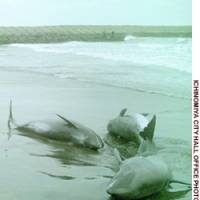About a dozen melon-headed whales that recently beached in Chiba Prefecture and died had mercury concentrations some 10 times higher than the level the government considers acceptable, a study showed Tuesday.
Tetsuya Endo, a lecturer at the Health Sciences University of Hokkaido, said the high concentration of mercury was detected in the whales' muscle tissue.
It has been widely known that dolphins and whales tend to accumulate high levels of mercury through the food chain because of their long life span. Some short-finned pilot whales, which are eaten in parts of Japan, are known to contain high levels of mercury.
Examinations of the beached melon-headed whales, a species for which data have been unavailable, show they also can contain high levels of mercury.
Endo and other researchers measured the total amount of mercury in the muscle, liver and kidneys of more than 10 carcasses and detected an average of 4.5 mg of mercury per kilogram of muscle, far higher than the 0.4 mg the government considers normal. The highest level was 11.0 mg, they said.
The researchers detected an average of 119 mg of mercury in the whales' livers and 6.3 mg in the kidneys.
Melon-headed whales are not eaten in Japan, but Endo said the public should be cautious.
"While we were studying the whales, some onlookers said they looked appetizing. But I would not recommend eating them," he said.


















With your current subscription plan you can comment on stories. However, before writing your first comment, please create a display name in the Profile section of your subscriber account page.